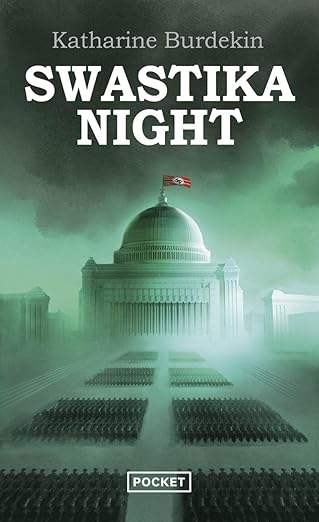Ana Melendo's contribution
Swastika Night by Katharine BURDEKIN (written under the pseudonym Murray CONSTANTINE) If it had been written after 1945, it would have been an alternative story, but K. BURDEKIN wrote this novel in 1937, so we’re dealing with a dystopia. Seeing the rise of Nazism and the threat of a world war, she imagines that Germany wins and extends this deadly ideology to half of the world, the other half being conquered by a fascist Japan. At the contrary of others stories of this kind, the novelist does not give the priority to action, but to description and reflection. A narration set between George ORWELL’S 1984 and Margaret ATWOOD’s The Handmaid’s Tale.
The Book
Swastika Night, written by
Katharine Burdekin under the pseudonym Murray Constantine in 1937, is a powerful dystopian novel that imagines a world where Nazi ideology has triumphed and become the foundation of global society. Set seven centuries into the future, the book depicts a world in which
Adolf Hitler is worshipped as a god and women are reduced to powerless, subservient roles. Burdekin’s narrative anticipates themes later explored by George Orwell in 1984, particularly the manipulation of history and the erasure of truth. What makes Swastika Night remarkable is not only its early criticism of fascism but also its sharp
feminist perspective, which exposes the destructive consequences of
patriarchy and
authoritarianism. The novel challenges readers to reflect on the
fragility of democracy and the dangers of unchecked ideology. Today, it remains a significant and unsettling warning about the consequences of
totalitarian thought and the silencing of
individual freedom.
The Author
Katharine Burdekin (1896–1963) was a British novelist best known for her groundbreaking dystopian and feminist works. Born in
Derbyshire, England, she was educated at
Cheltenham Ladies’ College but largely developed her literary voice outside academic institutions. During the 1920s and 1930s, she published several novels, often exploring themes of gender, power, and politics. Her most famous work, Swastika Night (1937), was released under the male pseudonym Murray Constantine to protect her identity and to give her critiques of fascism greater authority in a male-dominated literary world. Burdekin’s writing was ahead of its time, addressing issues of totalitarianism, the manipulation of history, and the systemic oppression of women. Although much of her work went unrecognized during her lifetime, modern scholarship has rediscovered her contributions to feminist and speculative fiction. Today, Katharine Burdekin is remembered as a visionary writer who dared to imagine dark futures in order to challenge the injustices of her present.



No comments:
Post a Comment
Thank you very much for your comment.
We are waiting for you soon!